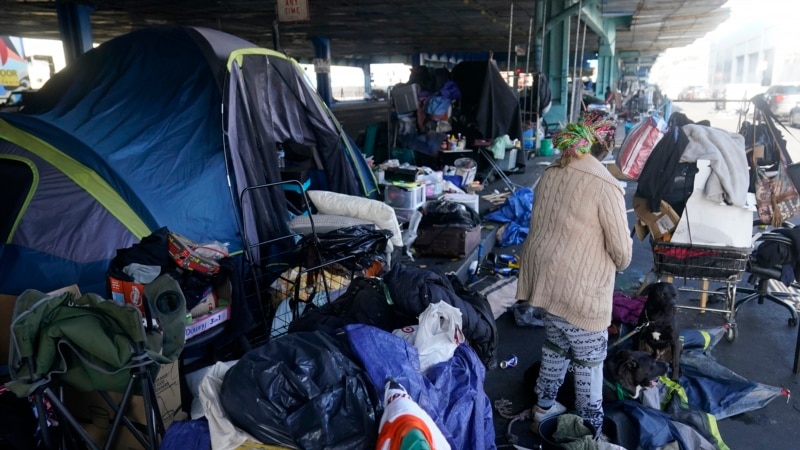The most significant homelessness case in decades has reached the Supreme Court as a record number of Americans are without a permanent place to live.
On Monday, justices will consider a challenge to a California appeals court ruling that found punishing people for sleeping outdoors when shelters run out of space amounts to unconstitutional cruel and unusual punishment.
Political officials across the West and in California argued that the decisions limited them from taking “common sense” measures aimed at preventing homeless encampments from taking over parks and sidewalks. California is home to nearly one-third of the nation’s homeless population.
Advocacy groups say the decisions provide necessary legal protections, especially as housing costs soar and more people are forced to sleep outdoors.
The Supreme Court case comes from Grants Pass, a small city nestled in the mountains of southern Oregon where rents are rising and there is only one overnight shelter for adults. As more tents gather in the park, the city bans camping and imposes $295 fines on people who sleep there.
The U.S. Court of Appeals for the Ninth Circuit largely struck down the camping ban because it found it unconstitutional to punish people for sleeping outdoors without adequate shelter. Grants Pass appealed to the Supreme Court, saying the ruling left it with few good options.
“It really leaves the city unable to address the growing number of encampments that are unsafe, unhealthy and problematic for everyone, especially those experiencing homelessness,” said attorney Theane Evangelis, who represents Grants Pass. “
The city is also challenging a 2018 ruling called Martin v. Boise, which for the first time banned camping when there was a lack of shelter space. It was issued by the San Francisco-based Ninth Circuit and applies to the nine Western states within its jurisdiction. The Supreme Court declined to raise a different challenge to the 2019 ruling before solidifying its current conservative majority.
Supporters say if the decision is overturned, cities will have an easier time dealing with homeless people by arresting and fines them instead of helping them get shelter and housing.
Jesse Rabinowitz, director of campaigns and communications for the National Law Center on the Homeless, said: “The homeless population continues to grow in Grants Pass and across the United States because more and more people are experiencing homelessness. “More hard-working people are struggling to pay their rent, not because we lack ways to punish people for sleeping outside,” he said, adding that laws against sleeping in public places had increased by at least 50 per cent since 2006.
Homelessness in the U.S. rose 12% to its highest reported level as rents soared and coronavirus pandemic aid dwindled, leaving more people without access to housing, federal data showed. A federal report found that four in 10 homeless people sleep outside.
More than 650,000 people are estimated to be homeless, the most since the country began using annual point-in-time surveys in 2007. Advocates say people of color, LGBTQ+ people and the elderly are disproportionately affected.
Two of the four states with the largest homeless populations in the United States — Washington and California — are in the West. Officials in cities like Los Angeles and San Francisco say they don’t want to punish people simply because they are forced to sleep outside, but cities need to have the authority to control growing encampments.
“I never wanted to criminalize homelessness, but I wanted to be able to encourage people to receive services and shelter,” said Thien Ho, the district attorney in Sacramento, California, where homelessness has increased dramatically in recent years. .
San Francisco says it has been blocked from enforcing camping rules because the city doesn’t have enough shelter space to house all of its homeless people, which it would cost an estimated $1.5 billion to provide.
“These encampments often block sidewalks, prevent employees from cleaning public roadways, and pose health and safety risks to homeless people and the public at large,” city attorneys wrote. City workers also encountered knives, knives, and knives at the encampments, they said. Drug dealing and militant people.
Several cities and Democratic California Gov. Gavin Newsom urged the high court to preserve some legal protections while limiting “overreach” by lower courts. The Martin v. Boise ruling allows cities to regulate and “clear” encampments but cannot impose blanket bans in communities with insufficient shelter beds.
The Justice Department also supports the idea that people should not be punished for sleeping outside when they have nowhere to go, but said the Grants Pass ruling should be overturned because the Ninth Circuit did not define “involuntary” Meaning, something went wrong. Homeless. “
Grants Pass attorney Evangelis doesn’t think the Biden administration’s position will solve the Oregon city’s problems. “Cities can’t really solve the homelessness crisis,” she said.
Public encampments are not a good place for people to live, said Ed Johnson, director of litigation at the Oregon Law Center, which represents residents outside the Grants Pass area. But enforcing camping bans often makes homelessness worse by requiring people to spend money on fines instead of housing, or leaving them with arrest records that make it harder for them to find an apartment. He said public officials should focus on solving the affordable housing shortage so people have a place to live.
“It’s frustrating when people who have all the power throw up their hands and say ‘there’s nothing we can do,’” he said. “People have to go somewhere.”
The Supreme Court is expected to rule by the end of June.
Follow us on Google news ,Twitter , and Join Whatsapp Group of thelocalreport.in
